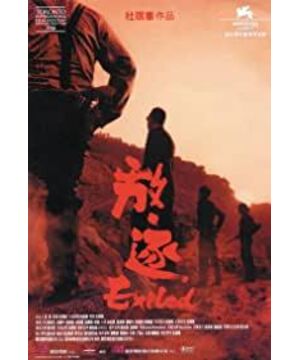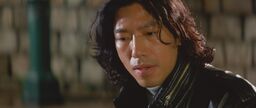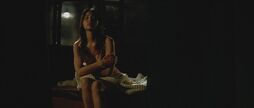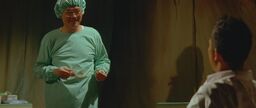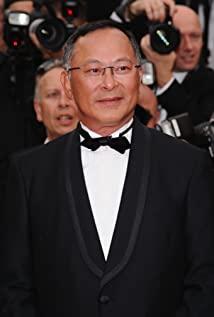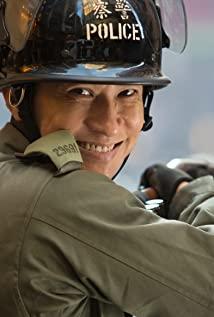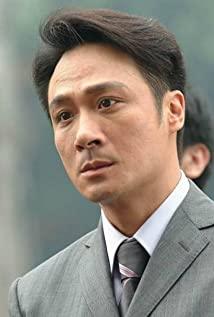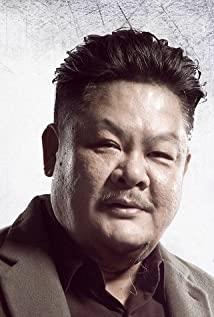To Qifeng turned out to be an editor, no wonder the story is so wonderful.
I don't even remember how many times I laughed while watching "Gun Fire": a few people were so bored that they kicked paper balls; the matches in the cigarette ignited sparks; after completing the task, several people claimed to be the perfect combination; in the end, Huang Qiusheng was smoking a cigarette in the car and was relieved The smile... I believe that a film that can make the audience smile from the heart is excellent. To Qifeng admires Akira Kurosawa, it is not difficult to understand why the male protagonists have the feelings of Japanese samurai and the spirit of seeing death as home in the final battlefield. I remember that Akira Kurosawa's final work was "The Oil of the Toad". Looking back, the master once again mocked himself as an ugly toad. See you in the rivers and lakes...
Compared with "Gunfire", as a girl, I still prefer "Exile" more . The dim yellow tone of the film is very warm and nostalgic, and the perception of things and shooting techniques are more mature than before. I have seen his later works "Single Men and Women", "Big Men Have Great Wisdom", "Slimming Men and Women" and other romance films. Different from the early gangster films, they seem to be commercial films that cater to the needs of the market. Facing the "scissorhands" in the mainland , from "not compromising, not bowing your head" to abiding by the rules of the game, there are more or less "understanding and bending" elements in it. Du Qifeng, who has passed his destiny, paid tribute to the master, and at the same time learned the taste of "Zen" in the master: a mother, a child and a family, the combination of "wu and Zen" makes their mission and story. Fuller and intriguing.
a man's movie
"Exile" is a man's movie. From a few people kicking paper balls in "Gunfire" to a few people kicking cans at the end of the film, the transmission and continuation of this kind of friendship between men may only be understood and understood by men. After a few people gathered, there were no more words, just looked at each other and smiled, and there were many emotions in them. When Zhang Jiahui arrived home, there was a fierce battle that lasted for more than two minutes, until the cries of the children stopped the hail of bullets. Seeing Huang Qiusheng's relaxed and familiar expression, I believe that the audience's tense heart was relieved. To Qifeng's portrayal of the other side of men is absolutely familiar: Huang Qiusheng, who was holding a rocking chair with a wooden horse when moving house; Wu Zhenyu, who disliked the fat man's huge body and was conscientious and focused; the fat boy who was sweating and ordering the door; Zhang Yaoyang, who was cutting carrots in the candlelight, Huang Qiusheng picking vegetables... These childish and warm scenes are rarely seen in traditional ruthless killers. But too much harmony is disharmony. This kind of foreshadowing is doomed to surging undercurrents, so that everyone's group photo after dinner seems to tell the audience that this is their last supper.
Because of the existence of women, I
watched a few gangster movies of Johnnie To, which showed a man's world: killing, loyalty, rivers and lakes, big brother. However, Director Du, who is over 500 years old, seems to no longer blindly pursue pure blackness and grievances. In "Exile", the killer also has a wife and children. When Zhang Jiahui died, the angry wife pointed a gun at the child and wanted to kill him, but she couldn't, because she was a mother; in the hotel, she met Huang Qiusheng, who mistakenly thought she had killed her husband, shot him a few times, and in his arms The child woke up with a start, and the cry woke her up, but she still couldn't do it, because she was a woman. Women seem to be born with sympathetic feelings, and their innate maternal feelings make them warm, brave, and tenacious, and can tolerate men like their children who make mistakes. When men are fighting ruthlessly, the existence of women represents the love and origin of this world. After seeing the weaknesses of human nature, they still do not change their original intentions. The struggle between men in the film is in stark contrast to the love and motherhood of women. For men, it is comfort and home, while children are hope and future.
When the injured are outside, they will turn against their home
Perhaps the most wanted gift for men is a window with lights on. I don't remember how many times He Chaoyi leaned over and looked at the window with lace curtains in the film. At the beginning of the film, a warm scene was created that made these rootless and homeless men yearn for. In the candlelight after the fight, several men were waving the bowls and chopsticks like wolves and tigers, and the family gave them the belonging and peace of mind. Heartfelt relaxation and kindness. After Huang Qiusheng spit out the bullet, everyone laughed knowingly. The grace and beauty of the family ignited the old friendship. However, everything is so short-lived, and the most common thing in the film is "Where to go? Where to go? Where to go??" It's all in it... Yes, "When the injured are outside, they will turn against their home!" When injured and disappointed, after wandering and wandering, only home is the final destination and harbor of the soul: the car drives downstairs, and the lights are still dim. With the anxious eyes of the hostess and the half body leaning out of the window, she waited endlessly, and gave love and hope without abandoning. The head of the family no longer exists, and a few men use the method of tossing a coin to decide where to go, which makes people feel sad and helpless. It is the "Tree on the Roof" written by Yang Lingye, which does not belong to the remote jungle, does not belong to any one Hand planting, does not belong to this city. No name, no home, no roots, no support. I don't know where to go, wandering and wandering like a lonely ghost in this lively and gorgeous metropolis. Such a fate is destined to be a bright night, and this group of lonely believers does not have a window that belongs to their own lights.
Regarding Wu Zhenyu and Du Qifeng,
it may be that the "Nervous Heroes" is too deeply imprinted, and the first impression of Wu Zhenyu will always remain in the state of being neurotic, incomprehensible, and disliking. From "Gunfire" to "Exile" to an elegant underworld in "Infernal Affairs 2", his performances, both good and evil, subverted my impression of him. But it's still very depressing. It seems that the first impression is very important.
To Qifeng, has been thinking about what word to use to describe him, a literate underworld? A big man with small feelings? His control of the camera is too strong, the information conveyed by the language of the screen is too rich, and the choice of background music is always seamless. Hong Kong and men pin the rivers and lakes in his heart and in the camera. Alas, such a director is a monster.
Regarding John Woo and Johnnie To
, it is natural to compare him with John Woo in these shootout films. Du Qifeng, who is an editor, is better at telling stories than Wu Yusen. The narrative is smooth, relaxed and has a strong sense of rhythm. Unlike Wu Yusen's scenes, where the characters are either black or white, Du allows the characters to have gray areas, which are exactly the places where the ink has not been touched. Good at leaving white space to give people unlimited imagination. Compared with the hero in Woo's lens, I prefer Du's delicacy, realism and grounding. The hero image of "Little Pony" created by John Woo is "too big"! It makes people look on their backs, and their neck hurts when they look up. Du Qifeng seems to be more close to the people. Whether it is Huang Qiusheng, Liu Qingyun, Ren Dahua, and Wu Zhenyu, they all seem to have a little bit of ruffianness and a little evil spirit, a triad that is more in line with the triad. Whether it is a big guy or a small person, their fate is wandering and confused even when the centaurs are assassinated. Du, who prefers slow motion more, pays attention to the excavation of the deep world of the characters. There are no white pigeons flying in the sky before his death, no arrogant rhetoric, only accepting the cruel reality in despair and helplessness. What is left is the last dignity of a man, which makes people respect, sigh, and forget each other in the rivers and lakes...
View more about Exiled reviews


